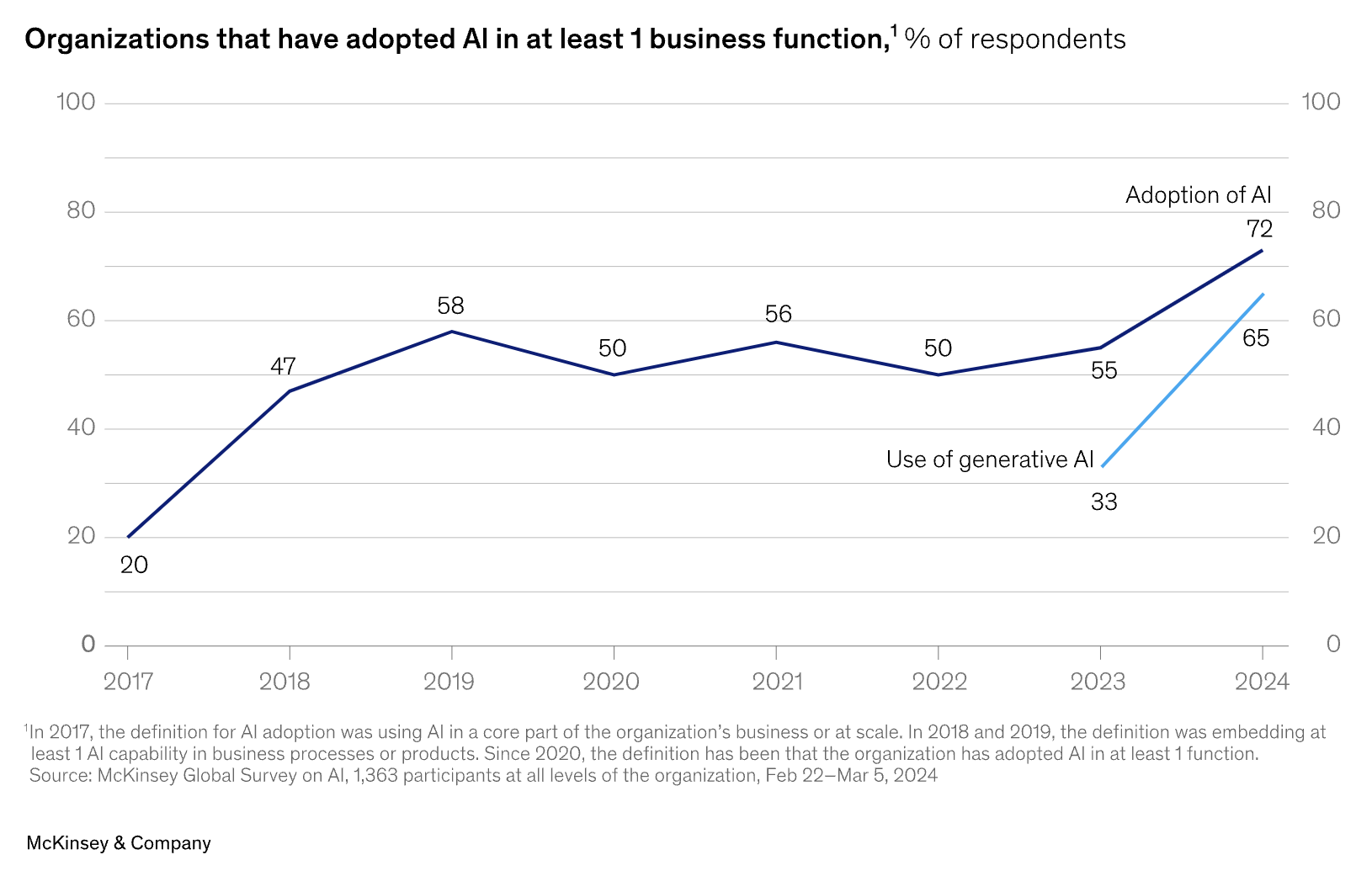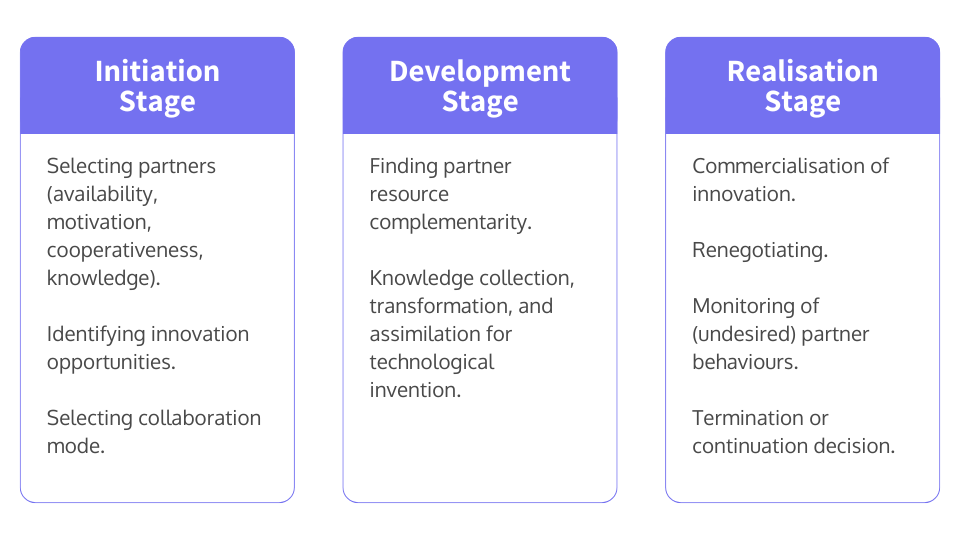The swift progress in AI technologies has opened up numerous possibilities for businesses to enhance their operations, customer service, and data analysis, thereby securing a competitive edge in their industries. AI has the capability to revolutionise business practices by automating routine tasks, supporting human decision-making, and extracting insights from large volumes of both internal and external data.

Source: The State of AI in Early 2024
Despite the significant growth and increasing investments in various AI technologies, many companies still struggle to recognise the potential business value of AI. Organisations often find it challenging to pinpoint areas where AI can effectively address their business challenges, like managing Open Innovation.
Let’s dive into the topic.
The business value of AI today lies in its ability to drive efficiency, innovation, and competitive advantage across various industries.
What are the main areas where AI adds significant value?
AI streamlines repetitive and time-consuming tasks, allowing businesses to reduce operational costs and improve productivity. Tasks like data entry, customer service through chatbots, inventory management, and administrative processes are automated, freeing up human resources for higher-value work.
AI enables data-driven decision-making by analysing vast amounts of structured and unstructured data. Predictive analytics, machine learning models, and AI-driven insights help businesses make more accurate forecasts, identify trends, and improve strategic decisions, leading to better outcomes.
AI personalises customer interactions by analysing customer behaviour and preferences. Recommendation engines, personalised marketing, and AI-powered customer service systems provide more tailored experiences, increasing customer satisfaction and loyalty, while AI-driven chatbots and virtual assistants offer 24/7 customer support.
By automating tasks, optimising workflows, and improving resource allocation, AI helps businesses reduce costs. Predictive maintenance in manufacturing, for example, can prevent equipment breakdowns, reducing downtime and saving on repair costs.
AI fosters innovation by enabling the development of new products and services that were not possible before. For instance, AI-powered products like voice assistants, autonomous vehicles, and personalised healthcare solutions have opened new revenue streams for businesses.
AI helps businesses identify risks and mitigate them more effectively. In finance, AI-driven algorithms detect fraudulent transactions in real-time, reducing financial losses. In cybersecurity, AI helps predict and prevent potential threats before they occur.
AI enhances supply chain management by optimising inventory levels, predicting demand fluctuations, and improving logistics. AI-powered solutions can foresee disruptions, enabling companies to adjust their supply chain strategies accordingly, minimising delays and excess costs.
AI complements human capabilities by handling complex data processing and automating mundane tasks, allowing employees to focus on creativity, strategy, and higher-level problem-solving.
Companies that effectively adopt AI technologies gain a competitive edge. AI helps them operate more efficiently, innovate faster, and provide superior customer experiences, positioning them better against competitors.
AI enables businesses to scale their operations without proportionately increasing costs. Automation and AI-driven insights allow companies to handle growing volumes of data, transactions, or customer inquiries more efficiently.

Source: AI for Managing Open Innovation
The initiation stage of Open Innovation projects presents significant challenges, including the search for partners that create the need to process a considerable amount of relevant knowledge and sources. AI has the potential to alleviate human constraints in managing these diverse challenges.
AI as scout – Partner and innovation opportunity identification
AI may foster more radical innovation by identifying and evaluating distant knowledge and unfamiliar partners, thus helping to overcome cognitive information processing constraints.
Through AI-powered matchmaking platforms like Novable, companies can identify potential partners whose capabilities complement their own, facilitating mutually beneficial collaborations that drive innovation and accelerate growth. We start with a good base given by AI speed and quantity, for then validating the results with human expertise. The best of both worlds.
Startups bring expertise and big corporations vast resources. This is key to tackling complex challenges in healthcare, climate change, renewable energy, and every industry you can think about.
AI as matchmaker – Partner reconnaissance
Managers play a key role in understanding how diverse, specialised partners can collaborate effectively. This involves setting communication standards and determining collaboration methods. AI can assist by analysing information gaps between partners and predicting the best modes of interaction to address them.
AI as forecaster – conflict foresight
It is important to assess potential risks and barriers that could affect the success of Open Innovation projects. Anticipating conflicts can be difficult due to the complexity of factors like technology and competition. AI can aid by simulating various scenarios, identifying possible hurdles posed by partners or market developments, and providing insights that managers may not foresee.
During the development stage of Open Innovation projects, companies need to collaborate with various partners to share and exchange knowledge. Managers are responsible for coordinating information sharing and integration among partners, a process that can greatly benefit from AI technologies.
AI as a cartographer – facilitating knowledge recombination
One of the key challenges in OI is developing complementarity between the knowledge of different partners. This complementarity often cannot be fully identified in advance and becomes apparent only after the collaboration begins. By highlighting opportunities for knowledge recombination, AI can help firms overcome internal resistance by mapping and visualising the potential benefits of Open Innovation.
AI as a conductor – Supporting knowledge integration
In Open Innovation, integrating diverse knowledge from different partners is essential for creating new innovations, but this process can be challenging. Effective management requires conditions that encourage knowledge sharing in compatible formats without stifling creativity or causing resistance. AI can facilitate this by creating a collaborative environment where knowledge is shared smoothly and consistently.
AI as a whistleblower – acting as an early warning system
AI can also function as an early warning system in Open Innovation projects, detecting and reporting potential violations, unethical behaviours, or partner conflicts. By identifying issues early on, it allows managers to take timely corrective actions, reducing the risk of opportunistic behaviour or conflict escalation.
During the realisation stage of Open Innovation projects, managers face challenges such as identifying valuable innovations for commercialisation, selecting appropriate business models, and resolving tensions between joint value creation and individual firm value capture.
AI as a vanguard – Evaluating business opportunities
In the realisation stage, the focus shifts from developing solutions to selecting the best commercialization opportunities. Managers may often rely on familiar business models, limiting the exploration of new possibilities. AI can assist by comprehensively evaluating a wider range of business models and potential opportunities, providing valuable insights.
AI as a Broker – Optimising resource deployment
Effective resource deployment is critical for commercialising innovations, but managers often face challenges due to complex partner interdependencies. AI can assist by improving the efficiency and effectiveness of resource allocation.
AI as Custodian – Protecting knowledge and intellectual property
The success of Open Innovation projects depends on fair distribution of the value created among partners. Intellectual property (IP) tools are essential for defining ownership and ensuring fair rewards. However, agreements are often incomplete and require renegotiation. AI-based systems can safeguard partner interests by detecting IP violations and providing objective resolutions, acting as an effective mediator or arbitrator.
Greater openness.
While it enhances knowledge protection, AI also raises concerns about how to safeguard sensitive information, particularly when recombining knowledge or identifying partners. Trust in AI tools to impartially manage and protect data is crucial for their acceptance.
Reduced transaction costs.
AI can lower the costs associated with managing Open Innovation projects, making collaboration easier and opening innovation opportunities. This could accelerate competition, especially for startups, while benefiting established companies with large data pools. However, this might raise concerns over market dominance by larger firms that can afford expensive AI solutions, potentially limiting smaller enterprises’ access to Open Innovation projects.
Organisational change.
AI integration could reshape organisational structures and job roles. Increased centralisation might be required for coordination tasks, which may displace current skilled employees responsible for these functions.
Behavioural and psychological responses.
While AI can help reduce biases, it may also create new ones due to the complexities of human-AI interaction. Issues like techno stress, anxiety, and the pressure from constant AI monitoring could affect employee well-being and autonomy.
What is your opinion on the topic? Share your thoughts with us on LinkedIn!